Rallying a ‘Tartan army’ in Scotland
ELLON, Scotland, May 6, 2015 - "Parlez-vous anglais?" Alex Salmond greeted me with a handshake and a joke as he ducked the rain and walked into the entrance hall of the hotel in Ellon, a small town in northeast Scotland, where he was taking part in an election hustings.
The former leader of the Scottish National Party apologised for missing his interview with Agence France-Presse earlier in the day, explaining that four times as many supporters had turned up at his book signing than he had expected and he couldn't get away.
When we met at the end of March the SNP was on course to win most of Scotland's 59 parliamentary seats, an astonishing result just months after it lost its bid for independence from the rest of Britain in September's referendum.
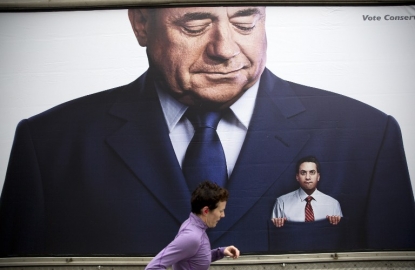 A lorry displays a Conservative poster picturing Labour Party Leader Ed Miliband in the pocket of former Scottish First Minister Alex Salmond, in Birmingham, central England on March 14, 2015 (AFP Photo / Justin Tallis)
A lorry displays a Conservative poster picturing Labour Party Leader Ed Miliband in the pocket of former Scottish First Minister Alex Salmond, in Birmingham, central England on March 14, 2015 (AFP Photo / Justin Tallis)After seven years as first minister in Scotland's devolved administration, Salmond was campaigning to return to the House of Commons as MP for Gordon, a rural constituency in Aberdeenshire - where we had been trying to track him down all day.
Salmond's home turf
We had made a date with Salmond in Oldmeldrum, a small windswept town on top of a hill where the only signs of life on a Monday afternoon were a few kids out on their bikes.
Fortunately, a local SNP activist turned up to greet us. Lorraine Kelly, a childminder who had brought one of her charges along, explained that she used to vote Conservative but in recent years had supported the local MP, Malcolm Bruce, of the centrist Liberal Democrats.
Bruce was standing down at this election and Lorraine was working to help Salmond take his seat. She looked relaxed, and no surprise, as this part of Scotland is Salmond's home turf and few doubted he would sweep to victory here.
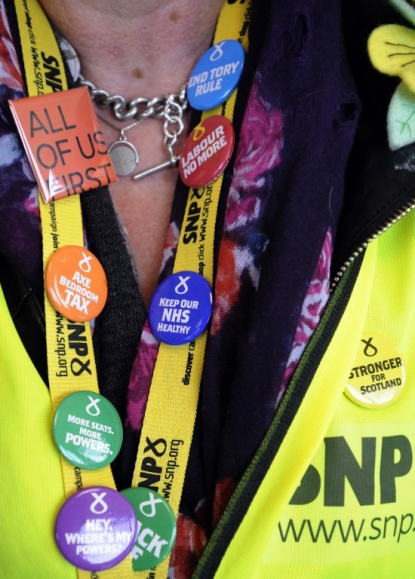
The badges of an SNP activist in Kilmarnock, Ayrshire, southwest Scotland on April 27, 2015
(AFP Photo / Andy Buchanan)
Lorraine admitted she didn't always like the nationalist leader, who can turn on the charm but also has a reputation as an old-fashioned political bare-knuckle fighter. She attributed her change of allegiance to the sense, relentlessly encouraged by the SNP, that Scotland has always been treated as England's poor relation. "All these years we've been put down," she said.
We chatted for 40 minutes, before a call came through - Salmond had been held up at his book signing and couldn't come. Lorraine didn't seem too put out. She took the hand of the little girl in her care, who had been quietly sitting on a bench swinging her feet to scuff her shoes on the pavement, and headed home.
Feisty performance
Back in the car, we drove through the countryside to Ellon where, a few hours later, we caught up with Salmond at a hustings with the other Gordon candidates, organised by a local business organisation.
He was again running late and looked tired, but quickly warmed to his theme, telling us that for the first time in a generation, "Scotland has an opportunity to have a decisive influence in the Westminster parliament".
(Video: Alex Salmond heads south, published April 2)
All the candidates put in a feisty performance, and the crowd were lively, with more than a few heckling the former SNP leader.
John Fyall, a local farmer, accused Salmond of working in the interests of large agricultural firms while in office, not small operators like himself. He complained the former first minister was too remote, saying he had tried and failed to arrange an appointment with him.
'Two loves: farming and Scotland'
Salmond went over to him afterwards and promised to address his concerns. But John, as a staunch nationalist, said he supported Salmond regardless. "I have two loves -- farming, and my passion for an independent Scotland," he said.
The whole thing felt like a piece of theatre - they knew, and we knew, that Salmond was on course to lead his "tartan army" southwards after the vote.
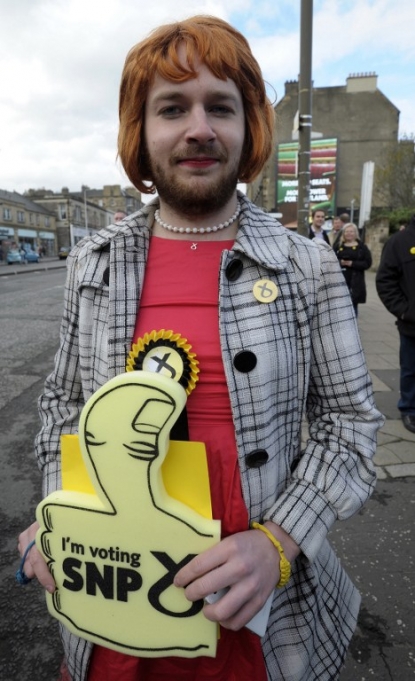
An SNP supporter dressed as First Minister of Scotland and leader of the SNP Nicola Sturgeon
in Edinburgh on April 30, 2015 (AFP Photo / Andy Buchanan)
Critics point out that the SNP's record in government in Scotland is far from revolutionary, a message that Labour MPs are trying to get across on the doorstep.
We joined one of those fighting to keep his seat from the SNP, Gregg McClymont, on a grim-looking housing estate in Cumbernauld, a town on the outskirts of Glasgow. Pushing fliers through letter boxes, wearing an overcoat and oversized hat against the periodic hail storms, he seemed upbeat, even though the odds were against him.
Nae immigration policy
Eddie Williamson, a 58-year-old former truck driver, stopped the MP on a path blocked by an overturned shopping trolley, and said he was considering giving him his vote.
He has supported SNP in the past and wants an independent Scotland, but complained about the party's support for migration. "Salmond is a great man, fantastic - but the SNP have nae immigration policy," he said.
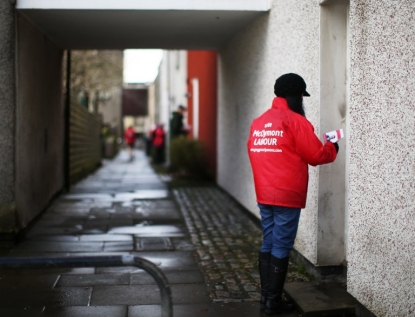
"upporters of Gregg McClymont, Labour MP, post leaflets as he campaigns in Cumbernauld, Scotland on March 31, 2015
(AFP Photo / Iam MacNicol)
Gregg said his team, in their matching waterproof jackets in Labour red, had been pounding the streets for weeks to keep up the momentum in this tough race.
Kissing babies
The problem for him, he said, is that SNP campaigners are "evangelical". While Labour could try to match them in terms of activists, nationalist supporters created momentum "by word of mouth and visibility... posters, putting stickers in cars - they do that well".
The SNP also waged an energetic old-fashioned campaign. Salmond's successor as leader and first minister, Nicola Sturgeon, criss-crossed Scotland in a helicopter with her image sprawled across the side, meeting voters, giving stump speeches and kissing babies.
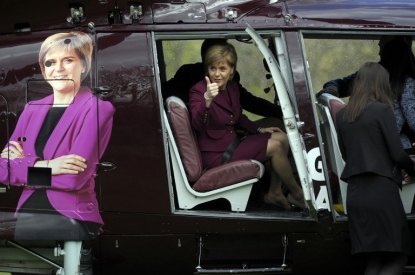 First Minister of Scotland and Leader of the Scottish National Party Nicola Sturgeon boards a helicopter in Edinburgh, Scotland, on April 30, 2015 (AFP Photo / Andy Buchanan)
First Minister of Scotland and Leader of the Scottish National Party Nicola Sturgeon boards a helicopter in Edinburgh, Scotland, on April 30, 2015 (AFP Photo / Andy Buchanan)Labour's Scottish leader, Jim Murphy, also spent time on the streets, facing down nationalist hecklers who tried to drown out his speeches with loud speakers.
It was a sharp contrast to the stage-managed campaign south of the border, where both Prime Minister David Cameron and Labour leader Ed Miliband seemed determined to avoid meeting ordinary members of the public - at least in a way that could be covered by the media.
Fifty people in a car park
My photographer colleague Leon Neal was on the Conservative "battle bus" for a week, but he and the rest of the travelling press had little access to Cameron, who travelled separately.
Most of the campaign events turned out to be little more than photo ops. Leon told me of one event in Cameron's constituency in Witney, near Oxford in southern England, pitched to the media as a rally. It turned out to be 50 people gathered in a college car park. They were handed placards which they waved at Cameron as he arrived, made a short speech, and then left again for an off-camera meeting with local activists.
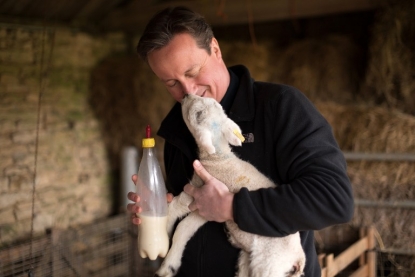 Britain's Prime Minister and leader of the Conservative Party, David Cameron feeds orphaned lambs near the village of Chadlington, southern England, on April 5, 2015 (AFP Photo / Pool /Leon Neal)
Britain's Prime Minister and leader of the Conservative Party, David Cameron feeds orphaned lambs near the village of Chadlington, southern England, on April 5, 2015 (AFP Photo / Pool /Leon Neal)The energy of the campaign in Scotland left many English people a little envious, even if the SNP's nationalist rhetoric and continued commitment to breaking up the United Kingdom has generated hostility south of the border.
I was chatting to one young voter in Manchester, northwest England, who explained to me why he didn't intend to vote. It was not that he didn't care, just that he didn't believe any of the politicians.
Pressed as to who he might pick if he changed his mind, the 23-year-old said: "Who is that Scottish woman who appeared in the TV debates?" Did he mean Nicola Sturgeon? "Yes, I might vote for her." I told him the SNP wasn't fielding candidates in England, so he couldn't back her. He looked disappointed.
Alice Ritchie is an AFP reporter in London.
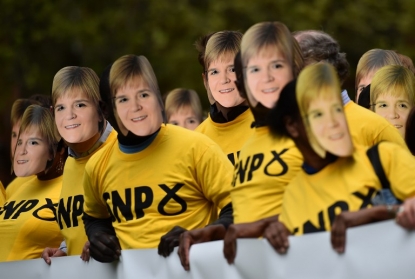 Conservative Party supporters wear masks depicting First Minister of Scotland and SNP Leader Nicola Sturgeon, in London on May 1, 2015, to highlight their projected outcome of an SNP and Labour coalition government (AFP Photo / Ben Stansall)
Conservative Party supporters wear masks depicting First Minister of Scotland and SNP Leader Nicola Sturgeon, in London on May 1, 2015, to highlight their projected outcome of an SNP and Labour coalition government (AFP Photo / Ben Stansall)

